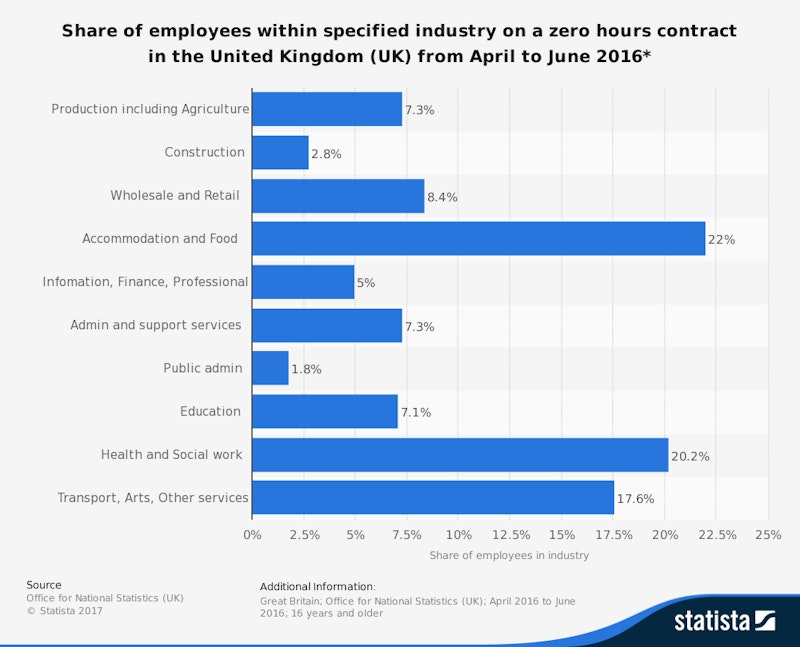Study Notes
Zero Hours Contracts (Labour Markets)
- Level:
- AS, A-Level, IB
- Board:
- AQA, Edexcel, OCR, IB, Eduqas, WJEC
Last updated 4 Apr 2018
Zero hours contracts do not guarantee a minimum number of working hours each week. In the UK labour market, people on “zero-hours contracts” are more likely to be young, part time, women, or in full-time education when compared with others in employment.

There has been an increase in the number of people employed on zero hour contracts in the UK labour market.
According to the latest data for the UK, between April-June 2017 there were 883,000 people in employment on a zero-hour contract (this is 2.8% of all people in employment).
Arguments in favour of zero hours
Supporters of these flexible employment contracts argue that they are good for businesses where demand and production is highly seasonal - for example in retailing, brewing, tourism and catering. Employing people on a zero hour contract may allow businesses to better control their costs.
Zero hours contracts might also benefit some people who want a high level of flexibility in choosing when they want to work.
Arguments against zero hours
A counter argument is that zero hour contracts have contributed to an increase in "in-work poverty" where people are not able to work enough hours each week (often at relatively low wage rates) to earn sufficient to avoid remaining in poverty and reliant on top-up welfare benefits.
Uncertain incomes also makes it harder for people to be given loans, mortgages and mobile phone contracts.

The 2017 Taylor Report on Good Work argued that employers should favour giving workers more certainty about the hours they work:
"Workers need to be able to make informed decisions about the work that they do, to plan around it, and to be compensated if arrangements change at short notice."
The Taylor Report drew on a decision by the fast food chain McDonald's to offer their workers a choice between zero hours and guarantee weekly hours.
McDonald’s offered 115,000 UK workers on zero-hours contracts the option of moving to fixed contracts with a minimum number of guaranteed hours every week. The company found that about 80% of workers in the trial chose to remain on flexible contracts and it reported an increase in levels of employee and customer satisfaction after the offer. (Source: Taylor Report, 2017)
You might also like

Bring Back Cedric the Pig!
21st January 2015

Wage Discrimination – Transgender and Caste Discrimination
5th August 2015
Chinese slowdown - the human cost for migrant workers
7th February 2016
Tribunal Fees and Workplace Discrimination
4th November 2016
Brexit - The Possible Impact on Cornish Tourism
12th December 2017
Contestable Markets (Online Lesson)
Online Lessons
Daily Email Updates
Subscribe to our daily digest and get the day’s content delivered fresh to your inbox every morning at 7am.
Signup for emails